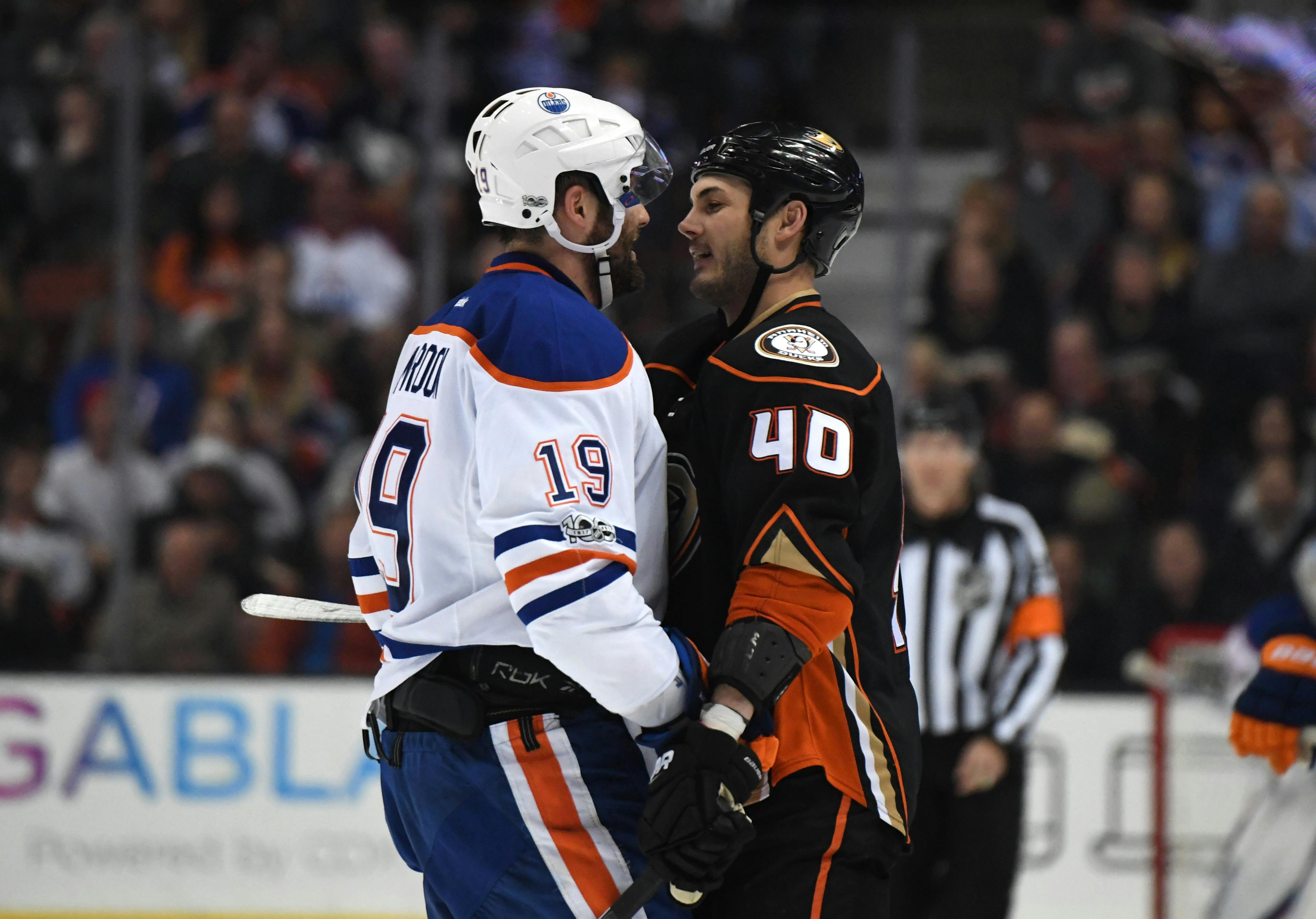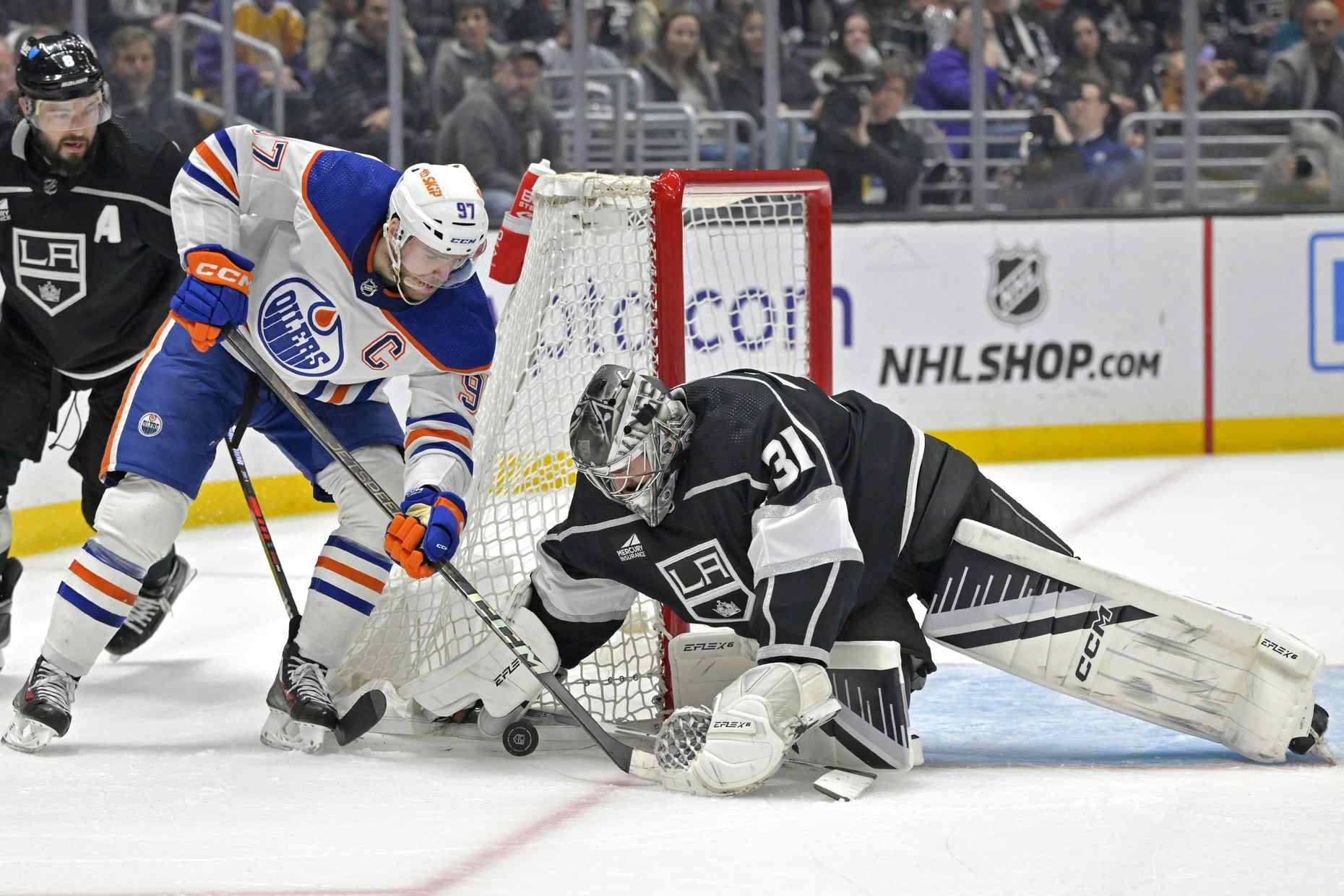Countdown to the season, question 9: Will the Oilers win the division?

By Jason Gregor
6 years agoThe Edmonton Oilers haven’t finished first in their division since 1987. They have played 29 NHL seasons without winning their division.
They were in the Smythe division from 1988-1993 with Calgary, Vancouver, Winnipeg, Los Angeles, and San Jose joined them for 1992 and 1993.
Then it was the Pacific Division from 1994-1998 with Calgary, Vancouver, San Jose, Anaheim and Los Angeles. Colorado joined the division in 1996.
Then the Northwest Division from 1999-2013 with Colorado, Vancouver and Calgary. Minnesota joined the division in 2001.
They’ve resided in the Pacific division since 2014 alongside Anaheim, Los Angeles, San Jose, Vancouver, Calgary and Arizona. Las Vegas will join their division this season.
Will their 29-year division drought end this season?
No team has gone longer without winning their division than the Oilers. During this span six other franchises have won the division the Oilers played in. Vancouver won the division nine times, Colorado won eight, (they’ve won 10 overall) Calgary won six and Minnesota and Los Angeles won it once. Anaheim has won the past four seasons.
Of course winning the division doesn’t guarantee a Stanley Cup — just ask the Washington Capitals — but usually the consistent, dominant teams are near the top.
Only Nashville (18 years) and Columbus (16 years) have not won their division since 1987. Expansion teams have won numerous titles, yet the Oilers have none.
In 25 seasons San Jose has won six. In their 24-year existence the Ottawa Senators have four, while the Tampa Bay Lightning have two. Anaheim has six in 23 seasons. Florida won their division twice in the past 22 seasons, while Minnesota has one in 16 seasons in the NHL. Even the Atlanta Thrashers won one, in their seventh season, before relocating to Winnipeg. The Arizona Coyotes led their division in 2012.
Here’s how many the rest of the NHL has won since the 1987/1988 season.
Detroit 16
Washington 10
Boston and New Jersey 9.
Pittsburgh and Dallas 8.
Philadelphia, Montreal, San Jose and Chicago 6.
New York Rangers 5.
Carolina, St.Louis and Buffalo 3.
New York Islanders and Toronto 1.
Washington 10
Boston and New Jersey 9.
Pittsburgh and Dallas 8.
Philadelphia, Montreal, San Jose and Chicago 6.
New York Rangers 5.
Carolina, St.Louis and Buffalo 3.
New York Islanders and Toronto 1.
As I stated earlier, winning a division doesn’t lead to a Stanley Cup, but since 2001 a division winner has won the Cup ten times. Colorado in 2001, Detroit in 2002 and 2008, New Jersey in 2003, Tampa Bay in 2004, Carolina in 2006, Anaheim in 2007, Chicago in 2010 and 2013 and Boston in 2011.

The Penguins never won their division in 2009, 2016 or 2017, but they finished second every year, and were second, fourth and seventh overall in the NHL. Chicago won in 2015, finishing sixth in the NHL. The 2012 and 2014 Kings were the only partial outlier, finishing third in their division both times. They were the eighth and sixth seeds in the Western conference and 13th and 10th overall.
I’ve heard some suggest the regular season doesn’t matter in the NHL, and while we’ve seen some teams get hot at the right time, often the Stanley Cup winner is one of the best regular season teams.
The Oilers had a solid regular season last year, topping 100 points for the first time since 1987. They are a good team, and they should remain in the top-ten in the NHL if they stay healthy.
They should make a serious push for the division title as well. The Ducks have won this Pacific Division all four years. They have a veteran team. They are deep. They have a young, very talented defence corps and they have two solid goaltenders. Ryan Kesler is 33 years old while Corey Perry and Ryan Getzlaf are 32. Could the youthful legs of the Oilers forwards allow them to dethrone the Pacific Division Champions?
There is a massive component of randomness or luck involved in the NHL, much more than people, especially players and coaches, want to admit. So it can be challenging to predict success.
However, history has proven when you have an elite player, once his team has some success it doesn’t take a drastic drop the next season.
Wayne Gretzky’s Oilers finished 16th and 13th overall in his first two seasons, but then won six consecutive division titles and finished first, second or third in the NHL standings for the next seven seasons.
Mario Lemieux’s Penguins didn’t make the playoffs his first four seasons, which is remarkable considering 16 of 21 teams made it. Once they got in they were a force for many years, with Lemieux and Jaromir Jagr leading the way. And they did it with Lemieux missing hundreds of games due to his battle with cancer and nagging back injuries.
Eric Lindros’ Flyers missed the playoffs his first two seasons, but won their division in 1995. They remained first or second in their division for the next ten years, finishing with 100+ points eight times and the final four years they did it without Lindros.
Sidney Crosby’s Penguins missed the playoffs his first year, then totaled 105 in his second season and averaged 104 points/seasons from 2007-2012. They had 72 points in the lockout shortened 2013 (prorated to 123) and have finished with 109, 98, 104 and 111 points the past four seasons. If we use their prorated totals from 2013, the Penguins have averaged 106 points/season the past eleven years.
Suggesting the Oilers are going to take a step back in McDavid’s third season, after the team tallied 103 points, and went to game seven of the second round, is a contradiction to past history of teams with an elite player like McDavid.
We could include Alex Oveckhin and his Washington Capitals in the conversation, as well as Patrick Kane and his Chicago Blackhawks. I realize the Capitals haven’t won a Stanley Cup, but they’ve been incredibly consistent in the regular season for the past decade. Is it possible, of course, look at the 2015 San Jose Sharks — they had some really good players, but no young McDavid–. The odds point to the Oilers remaining a very competitive team this season.
The Oilers are a legitimate contender to win the Pacific Division. The core of their team is still improving and the Oilers look poised to remain a top team for years to come. They won’t win the division every year for the next decade, but they should be right near the top.
I see their Division drought ending this season as they skate to the top of the Pacific with 106 points.
Will they win the division this year? Tell me why or why not.
Recently by Jason Gregor:
- Question #8: Can RNH return to 50 points?
- Question #7: What excites or concerns you about Benning?
- Question #6: Expectations for Jesse Puljujarvi
- Question #5: Can the Oilers mirror success of Pens, Kings and Hawks?
- Question #4: Who will surprise
- Question #3: Can Klefbom become a top-20 D-man?
- Question #2: What is the best role/position for RNH?
- Question #1 How many points with McDavid score?
Recent articles from Jason Gregor





